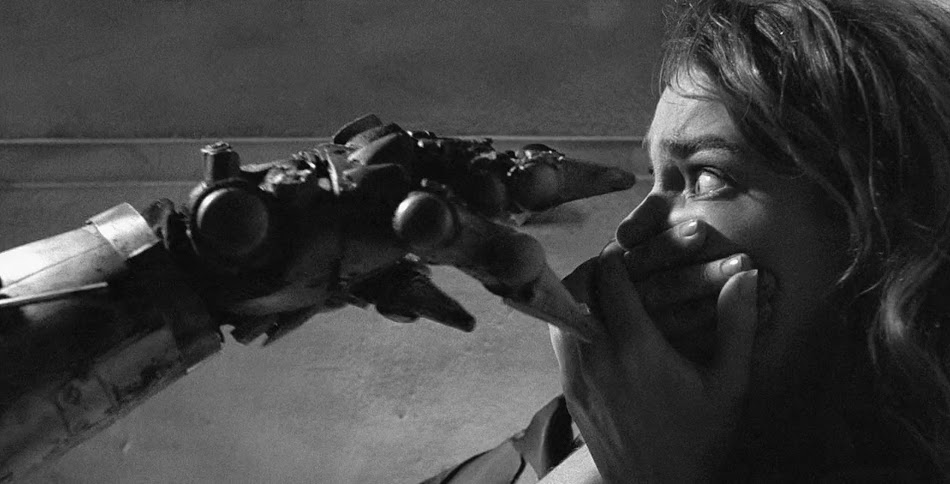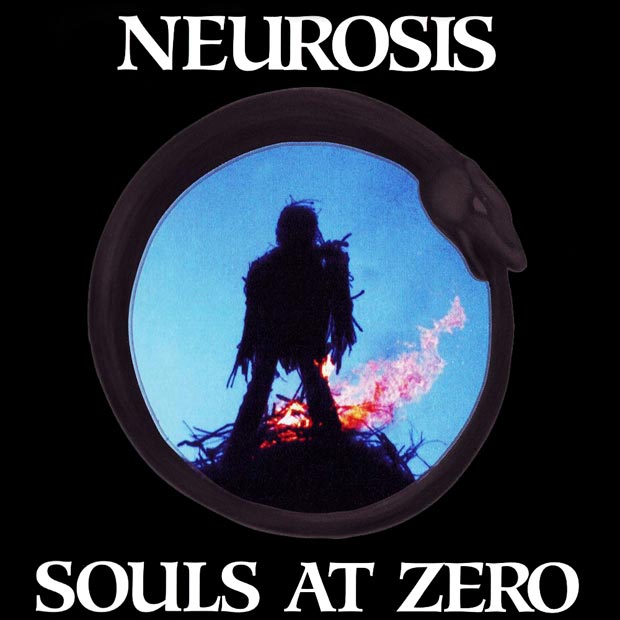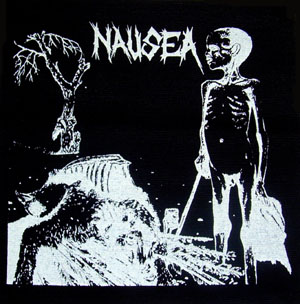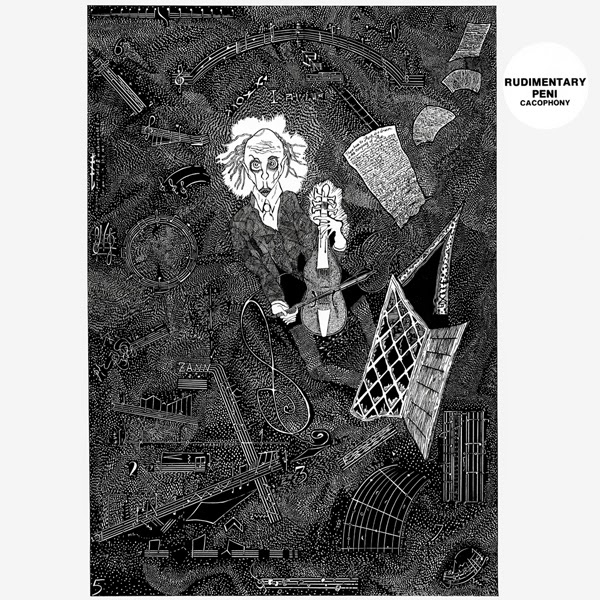Never let it be said that I don't love compiling lists. Whether they're year end lists, best in genre lists, or as is the case with my last entry here, most overlooked lists. I think a huge contributing factor as to what it is exactly about lists that I love, it's that it allows me to take stock of things that have maintained a consistent impact on me, whether that be cinema, literature, or in this case music.
The challenge here is that rather than tackling isolated genres, I'm approaching music in general. While a fair amount of what you read here will be extreme, it's not going to all be metal. The task is made even more ponderous by the fact that I've been pursuing the cultural phenomenon of music as a whole for the last twenty-five plus years of my life. Bear in mind that everything you read here is entirely subjective... as there's nothing more subjective than music in my opinion.
Anyway, I digress... this is a topic that I've been contemplating for a long time. You'd think that the idea of listing the ten most important overall albums from my perception would have occurred to me prior to now, and in fact it has but I've always just considered the task too daunting to pursue. I was recently motivated again on this front in part by YouTube contributor
Kanyon Bickel, and you can find his video in question
here. So without any further ado, let's get into it:
Neurosis - Souls at Zero
This album along with few others in its day completely changed my life. First hearing this in 1993, I'd had no warning of what I was in store for, and vague familiarity with Neurosis' previous two full lengths
Pain of Mind or
Word as Law was hardly preparation for what lies within
Souls at Zero.
Carrying an emotional heft that I was ill prepared for, and the most crushing apocalyptic dirges that I could fathom at the time. There is a depth to the instrumentation that even now is mostly unmatched by modern bands, along with the vocalizations of the three men behind the mics. The production is dense and claustrophobic and the sampling fits the lyrical themes with a perfection that few other bands can muster.
While each track more than holds up on their own, this is a work that begs to be taken in as a whole and now, 23 years after its initial release it still gives me chills. There aren't many other things out there that elicit an even remotely similar response in me, and from the onset of "To Crawl Under One's Skin" to the seismic crescendo of "Takeahnase" and dour "Empty"... I'm hard pressed to come up with another album as viscerally compelling or wholly realized, including later albums by Neurosis. This is what I hear in my head when I think about the world's end, and it's terrifying.
Incantation - Onward to Golgotha
Here's another 1992 release that while often imitated will never be reproduced. I would venture to posit that Onward to Golgotha went so far as to completely change the face of death metal as a whole upon being unleashed. Nothing before or since has been as enthrallingly and terrifyingly guttural or downtuned, doom-ridden, or densely evil (aside from maybe the demos that preceded this,
Blasphemous Cremation). Pillards vocals have been imitated more times than can be counted, but at the time this came out, and even when I first heard this, no other throat in death metal could roar with such devastation.
Every track on Onward to Golgotha crushes in a relentless journey that lasts 45 bewildering minutes and this was actually the first death metal album that I became obsessed with, picking it up for the first time when Mortal Throne of Nazarene was released. I loved both instantly, but this is the one that I have always come back to. It is distinctly evil and venomous, lacking the cartoonishness of Deicide, the cult obscurity of Cianide, or the ego stroking of Morbid Angel. That's likely why it was so simultaneously exhilarating and scary, because it was also clearly genuine and uncompromisingly sinister.
McEntee and Pillard's guitars are perfect, the bass of Ronny Deo beautifully muddy and syrupy, and Jim Roe's drumming was without peer. When people wonder why so many modern death metal bands are playing in this vein, I point to this record: a perfectly composed statement of misanthropy and deathly doom.
Rudimentary Peni - Cacophony
Cacophony is as its name would imply: a noisy dervish of a punk album played with little heed to structure or decency. It is also one of the most uniquely written and cohesively conceptual albums I've ever heard.
As a complex ode to HP Lovecraft it's without peer in and outside of its genre, replicating the chaos of the authors mind in the guise of dissonant punk rock just as informed by Bauhaus, Christian Death, or Alien Sex Fiend as it is by Crass, Icons of Filth, or Deviated Instinct. It's a gorgeous amalgamation of bouncy, bass heavy early 80's No Wave and UK punk that is both profanely ribald and frustratingly suppressed. A dichotomy of subversiveness and accessibility that makes it infinitely listenable despite its maelstrom of musical chaos.
This album found its way into my hands during a time that I was particularly obsessed with the works of Lovecraft, and this insight to the life of the author went leaps and bounds to weed its way into my emotional clutches. From Nick Blinko's characterized vocal performance to the abstract nature of the track flow, equal parts music and conceptual spoken bits. That it holds up today as well as it did then a testament to uniqueness and songwriting as true artistic craft.
Lurker of Chalice - Self Titled
Lurker of Chalice's only full length is the watermark by which I judge all other black metal. It's a perfect marriage of misanthropic USBM and the woeful melancholy of death rock and goth obscurity. It's also emotionally disturbing and psychically visceral, oozing with density and vehemence.
I had heard Jef Whitehead's other projects at the point I first came across this album in 2005, the same month as Leviathan's
Silhouette in Splinters. I was especially fond of the first Twilight album as well as Leviathan's own
Tentacles of Whorror, which despite their own distressing natures, don't even scratch the surface when it comes to the contents of this sole Lurker of Chalice album. Misanthropically obtuse, bewilderingly forlorn, cacophonously cavernous... underneath its jarring complexities, its gut-wrenching songcraft is also liltingly beautiful and masterfully layered.
The music is phenomenal; operatic even. There is a depth to the guitar playing and bass work and drum patterns that exposes Wrest's psyche like an open book. Tormented and distraught, and disturbingly alone. But for me its also optimistic in that the headspace of its author was a shared and identifiable phase, overcome by the wisdom allowed by the progression of time.
Burning Witch - Towers
Towers is probably the most hateful and vitriolic piece of doom metal composed for its time, 1998. Comparable to the misanthropy of early Electric Wizard or the slow motion apocalypse of Winter's slowed down Hellhammer worship, it stood on its own in terms of shrill venom. The plodding and heaving brutality of this EP is like a wrestling match between celestial bodies. Thick, tuned as low as they could go while remaining discernible.
When I bought this album so many years ago, it stayed on the turntable indefinitely. A staple of my room, amid the smell of bongwater and cigarette exhaust, bottom shelf whiskey and 22 year old angst. Feel bad music, for sure, but I could find something in each track that just elated me despite what some might call abusive replaying.
The vocals are a shrill exhortation that berates and defiles while the guitars are only interested in finding that perfect fugue of distortion and reverb soaked pummeling. The bass is seismic. And those drums methodically go for the throat like a feral dog force fed ludes and barbiturates. Martial thundering that never wavers in intensity. Just perfect.
Nausea - Extinction
Hands down my favorite crust record ever recorded. A testament of fevered, apocalyptic prophesy while at the same time viciously atheistic and angrily representative of a culture of perceived as gutter people.
Extinction rails against technology and religion with equal vitriol championing heathen ludditism, while being scarily prescient throughout the decades since its release.
Musically, this is an inferno of metallic crust that ups antes set by the likes of Final Conflict, Crucifix, or Septic Death. Al's and Amy's vocals an impassioned trade off of exasperated tirades and snarled spite while Victor's guitar work is both indicative of the genre and an elevated example of overlooked complexity whose bounds exceed simple crust punk. The bass is rich and resonates distinctly in rhythm with Roy's blitzing drums, galloping and pummeling in equal measure.
Like
Souls at Zero, I first heard this a
long time ago (though not upon release in 1990, shortly afterward) and it floored me. Conceptually and musically I was hooked and bewildered. Anthems like "Clutches" and "Inherit the Wasteland" still give me goosebumps to this day, and taken as a whole, it's just as transfixing during its duration as it was 25 years ago.
Ruins of Beverast - Unlock the Shrine
Unlock the Shrine came out about one year before the Lurker of Chalice LP and has held nearly equal sway over me since. I was in a bad spot back in '04, dealing with a lot of personal demons and inner conflict that hadn't surfaced as virulently since my late teens. Alexander Von Meilanwald's debut solo opus was both identifiably cathartic and soothingly medicinal despite its somber pace and tone.
Meilanwald's post Nagelfar (not Naglfar) project is far removed from the visionary German band that purveyed
Virus West, and has more in common with depressive black metal acts such as Shining or Bethlehem, minus the hilarious theatrics and over-the-top caterwauling. This piece is as grim as it gets, full of heartfelt melancholy and sombre dirges. While it remains black metal at its core, it's also crushingly heavy and hugely melodic. "Between Bronze Walls" sets the pace, with one of my favorite samples of all time, and it only gets better, with the epic "The Clockhand's Groaning Circles" an undisputed high point.
Regardless of my place in life at the time, this album never ceases to affect me as it did when I first heard it ten years ago. It's importance has never waned and while in the scheme of things it's still a relatively new album, I wouldn't hesitate to call it a classic. Expert composition and supreme instrumentation abound here, and not listening is doing yourself a disservice.
NOMEANSNO - Wrong
Absolute utter masterpiece. Simply genrefying this as punk is not only to be misinformed, but unforgivingly grievous to the musicians' vision put on display here. This does for hardcore what Gorguts'
Obscura or Atheist's
Unquestionable Presence both did for death metal in their day. This is jazz, pure and simple, overdriven, snide, and metallic jazz minus the horns.
There are no weak elements to be found here, from the performances (all of which are stunningly sharp and flawlessly executed), to the track flow, to the mixing and mastering. The guitar is punchy and twangy, overdriven and lightning fast. The basslines are masterworks, maybe only rivaled by fIREHOSE. The percussion is endlessly frenzied and perfectly measured to keep the tempo at a maximum. Vocally, it's as perfect as you can get on an album with this kind of heft. As a whole it's basically flawless.
The impact of songs like "The Tower", "Tired of Waiting", or "The End of All Things" is one that hasn't dissipated an iota since my first exposure. Epic and anthemic, subversively quirky and often hilariously over the top, it's something that I have been and will continue to be obsessed with. All the initially indistinguishable nuances and seemingly disparate elements working in tandem to form a single cohesively perfect whole.
Oneohtrix Point Never - Rifts
Rifts is actually three albums individually realized and then combined into a singular, cohesive vision. If I had to go to lengths to describe it, it would be to liken it to the greatest soundtrack for a sci-fi film that has yet to exist. Daniel Lopatin's project, involving albums
Betrayed in the Octagon from 2007, and 2009's
Zones Without People and
Russian Mind, and how they're arranged here they sound like they were meant to be presented this way.
Vast soundscapes litter this compilation, from loosely structured and highly ambient, droning and arpeggiated to very deliberately reminiscent of Tangerine Dream and the more obscure electronic composers working at the fringe of the krautrock movement. It's exasperatingly huge in concept and execution, but thematically and sonically concise. Intricately comprised and layered with a contradictory dense sparseness that I don't think I could hope to describe better. It's philosophic journey music, lilting and impeccable.
If I could only have one Oneohtrix Point Never project, obviously it's this one. So few other pieces of music are able to simultaneously stupefy, overwhelm, and uplift me like this one. A quality that could honestly be said of any of Lopatin's projects depending on the listener. Experimental and oddly accessible it walks a line few other electronic composers can with their works, and becomes able to define a distinct state of mind.
Absu - Tara
Tara is perfection. An album composed at the height of Absu's creativity which sees all of the elements on their works that preceded it kicked up to a swirling zenith of frenzied artistry disguised as mere black thrash. Marrying traditional Celtic odes and dirges of bagpipe driven folk that runs rampant with fantastical imagery, Scottish lore, and Qabalistic ritual.
I had been a huge fan of the albums
Barathrum,
The Sun of Tiphareth, and
The Third Storm of Cythraul, but life and its circumstances inevitably intervened in 2001 when
Tara was released, so I sadly ended up missing out on this for several following years. When I did finally get around to adding it to the collection it was all I listened to for
weeks. If I did try spinning something different I always came back to it, to the point where I had most aspects of the album memorized, whether the vocals/lyrics or the musical signatures of each of the players.
Proscriptor's drumming has never been more focused or relentless, his blast beats incessant and in perfect time and his martial rhythms a blitzed array of drumming supremacy. The guitar work of Shaftiel a razor sharp salvo of riffage and crescendoed dive bombs that teeter on absurd but for their perfect placement. Equitant's bass playing is equally rabid, a rich flutter of bottom end that somehow never loses pace to the drum work. And lyrically I don't think that Absu had or has since been so dense. This is stuffed to the nines with esoteric chanting and incantations so complex and involved it's ridiculous. I don't generally set foot in pits at shows anymore these days, but for Absu I'd make an exception... hell, I'd make exceptions for days here. Music is rarely better than this, past or present.













:format(jpeg):mode_rgb():quality(96)/discogs-images/R-1085997-1231160312.jpeg.jpg)


























